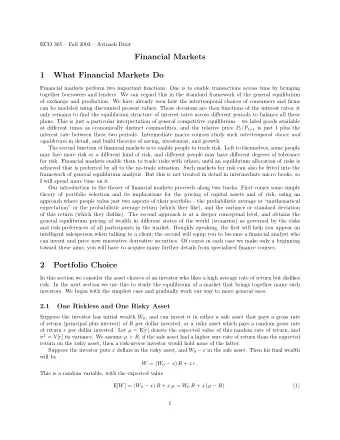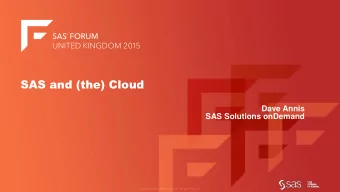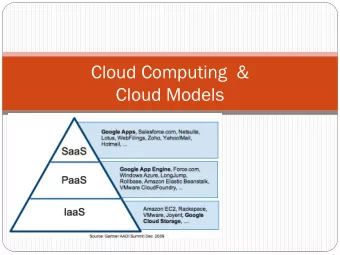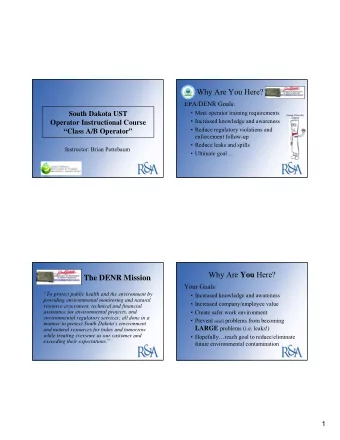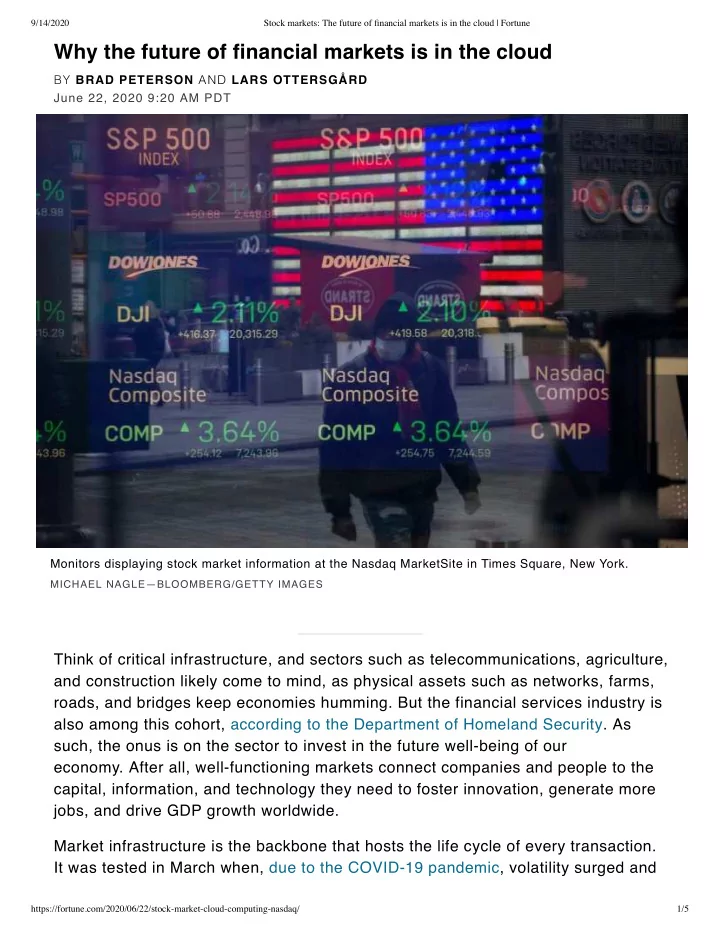
Why the future of financial markets is in the cloud BY BRAD PETERSON - PDF document
9/14/2020 Stock markets: The future of financial markets is in the cloud | Fortune Why the future of financial markets is in the cloud BY BRAD PETERSON AND LARS OTTERSGRD June 22, 2020 9:20 AM PDT Monitors displaying stock market information
9/14/2020 Stock markets: The future of financial markets is in the cloud | Fortune Why the future of financial markets is in the cloud BY BRAD PETERSON AND LARS OTTERSGÅRD June 22, 2020 9:20 AM PDT Monitors displaying stock market information at the Nasdaq MarketSite in Times Square, New York. MICHAEL NAGLE—BLOOMBERG/GETTY IMAGES Think of critical infrastructure, and sectors such as telecommunications, agriculture, and construction likely come to mind, as physical assets such as networks, farms, roads, and bridges keep economies humming. But the financial services industry is also among this cohort, according to the Department of Homeland Security. As such, the onus is on the sector to invest in the future well-being of our economy. After all, well-functioning markets connect companies and people to the capital, information, and technology they need to foster innovation, generate more jobs, and drive GDP growth worldwide. Market infrastructure is the backbone that hosts the life cycle of every transaction. It was tested in March when, due to the COVID-19 pandemic, volatility surged and https://fortune.com/2020/06/22/stock-market-cloud-computing-nasdaq/ 1/5
9/14/2020 Stock markets: The future of financial markets is in the cloud | Fortune volumes on Nasdaq’s markets reached historic peaks of more than 60 billion messages each day. That’s more than twice any previous record. Nasdaq’s market technology, which powers more than 100 other marketplaces worldwide, serves us well. However, a few realities and trends combined with recent extreme volatility underscore our belief that the future of the markets lies in the cloud. The writing on the wall Many trading firms co-locate their servers in exchanges’ local data centers to achieve the lowest network latency possible. However, that access comes with a tradeoff: Since physical space is at a premium, the co-located infrastructure isn’t suitable for storing large volumes of data or running analytics, making it less than ideal for those workloads. The elasticity of the cloud could address this issue. Managed services in the cloud are engineered to be compliant, performant, secure, and scalable. Outsourcing to a cloud-based managed service provider can reduce firms’ capital burden and allow them to focus resources on their core expertise and create differentiated offerings with a quick time to market. Meanwhile, fintech firms born in the cloud with lean, disruptive business models have gained traction. Some platforms and solutions are competing directly with the incumbents in the capital markets. Interestingly, large marketplaces and broker- dealers have begun partnering with fintech startups selectively as a way to innovate fast and with less risk. Additionally, most capital markets staff are working from home during the COVID-19 global pandemic, and this will likely continue until companies can bring employees back to the office safely. In our new normal, the cloud can help support remote teams and operations for an extended period of time. The writing is on the wall. More than ever, the capital markets will need to be dynamic, consistent and future-focused if we want to drive the economy forward. Shifting on-premises operations to the cloud will allow us to leverage evolving industry trends, launch new offerings quickly, improve service, as well as manage costs, risks, and unexpected volume spikes. Admittedly, there is still work to be done. The entire ecosystem needs to prepare for a new operational paradigm. We also need to jump some engineering hurdles around determinism (in other words, providing a consistent and predictable https://fortune.com/2020/06/22/stock-market-cloud-computing-nasdaq/ 2/5
9/14/2020 Stock markets: The future of financial markets is in the cloud | Fortune response time profile for transaction processing), latency, and fairness before equities transactions can be matched in the cloud, but these problems are solvable. A new operational paradigm Startup and smaller marketplaces perceive that buying servers and doing workloads on-premises is an old way of running a business, and a less complex access solution in the cloud is their preferred deployment option. They aim for a lean IT setup, with minimal capital expenditures and optimal operational expenses. A pay-per-use arrangement allows them to move into production quickly with predictable expenses as they grow. For example, ATG (AB Trav och Galopp), a Swedish gaming operator, is running pool betting using Nasdaq’s Longitude in the cloud, enabling efficient operations at scale. The U.K.-based Football Index is using cloud-deployed matching technology from Nasdaq. Well-established marketplaces may want to try out new offerings in the cloud as well. Instead of going through their internal IT procurement and deployment cycle, they can deploy products and services in the cloud as a proof of concept and decide later if they want to go on-prem or remain in the cloud. Moving the capital markets infrastructure to the cloud allows for the democratization of markets. Given the elasticity of the cloud, services that have been limited in availability, such as co-location, become seemingly unlimited. Leveraging the dynamic infrastructure and APIs, marketplaces and firms can benefit from increased agility, an even higher level of security than on-premises, and access to disruptive technologies including machine learning and A.I. to enable innovation. Compute power can be expanded and collapsed based on market conditions, removing the need to have large amounts of capital tied up in data centers provisioned for peak load and capacity. This is a huge advantage when it comes to coping with periodic surges in market activity and black swan events. A work in progress Most elastic use cases in financial services are data-related, especially in regulatory reporting and business intelligence. However, clearing, risk management, surveillance, and back office applications are also being deployed in the cloud nowadays. https://fortune.com/2020/06/22/stock-market-cloud-computing-nasdaq/ 3/5
9/14/2020 Stock markets: The future of financial markets is in the cloud | Fortune The major cloud providers have prioritized the elimination of technical, geographic, and regulatory obstacles that previously stood in the way of wider adoption by the capital markets. Simultaneously, they have invested heavily in innovation and geographic footprint expansion, and marketplaces are starting to take advantage of it. Nasdaq has been utilizing the cloud for more than 10 years, and many of our technology-based products and services are deployed in the cloud. Our biggest transition will be migrating our markets. In five years, we expect to have multiple Nasdaq markets running in the cloud, and in 10 years they will likely all be in the cloud. In addition to making this shift for the Nasdaq markets we operate, we’re making our Market Technology commercial offerings available in the cloud, and we plan to work with our clients to help them move when they’re ready. The investment trend and innovation in the cloud is here to stay and has further accelerated during the global pandemic. The time has come to concentrate on building the critical market infrastructure in the cloud. It will allow us to work smarter and manage better for the future prosperity of our industry and economy, and for the greater good of society. Brad Peterson is executive vice president and chief technology and information officer at Nasdaq. Lars Ottersgård is EVP and head of market technology at Nasdaq. More opinion in Fortune: Trump’s TikTok ban isn’t ‘tough on China’—it’s actually quite the opposite Why the Democratic Party must make a clean break with Wall Street Why the coronavirus pandemic has made 5G more essential than ever Gutting this federal program could undermine Americans’ confidence in a COVID vaccine The race for a COVID-19 vaccine shows the power of “community intelligence” Most Popular 50 years later, Milton Friedman’s shareholder doctrine is dead BY COLIN MAYER, LEO E. STRINE JR., AND OTHERS https://fortune.com/2020/06/22/stock-market-cloud-computing-nasdaq/ 4/5
9/14/2020 Stock markets: The future of financial markets is in the cloud | Fortune It would cost $1 trillion to move global supply chains out of China—but the long-term gains could be worth it BY REY MASHAYEKHI Why it makes sense for Oracle to buy TikTok. Sort of. BY ADAM LASHINSKY AND AARON PRESSMAN The World’s 50 Greatest Leaders (2014) BY FORTUNE EDITORS https://fortune.com/2020/06/22/stock-market-cloud-computing-nasdaq/ 5/5
Recommend
More recommend
Explore More Topics
Stay informed with curated content and fresh updates.


